Frequently Asked Questions
Questions about Kamaji?Choosing a summer camp is a big deal. Your camper will remember their experience for the rest of their lives, and many of our campers say their time at Camp Kamaji in Minnesota shaped their confidence and self-image. Here are some questions we often get asked!
Have A Question That’s Not Here?
Send us an email! info@kamaji.com
What is Camp Kamaji?
- A girls’ camp located in Northern Minnesota, about 200 miles north/northwest of Minneapolis- St. Paul, 110 miles west of Duluth and 15 miles east of Bemidji.
- A summer home to 130 girls, ages 7 to 15, and 90+ staff members.
- A residential camp that offers both a four – and eight – week session.
- A camp accredited by the American Camping Association.
- A safe, structured, supportive, supervised and positive place
- A place where diversity is valued — where differences are celebrated and similarities discovered
- A place where a camper is judged by her behavior rather than by her beliefs or her appearance.
- A place where campers are treated as individuals, not as stereotypes; where they are respected, trusted, encouraged, praised, loved and, most importantly, valued.
- Above all, Kamaji is a joyous, fun-filled, child-centered community — a place where kids come first.
What is Camp Kamaji’s philosophy?
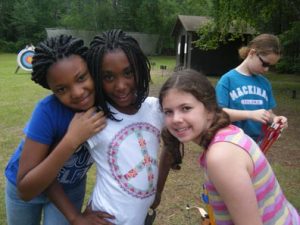 At Kamaji, courage is celebrated. We encourage girls to come to our camp without knowing anyone else here, that takes courage. While here, campers are encouraged to try activities they have never done before. We recognize them for their individual accomplishments and efforts.
At Kamaji, courage is celebrated. We encourage girls to come to our camp without knowing anyone else here, that takes courage. While here, campers are encouraged to try activities they have never done before. We recognize them for their individual accomplishments and efforts.
If a camper wants to wear red cowboy boots every day around camp, she becomes a camp icon. If a camper stands up on stage during the Variety Show to sing a solo and gets stage fright, the campers in the audience sing along to encourage her. We recognize the courage and strength it takes to put yourself out there to go to a new place, stay true to who you are and to try something outside of your comfort zone. Because of that, our camp community rallies around each other to celebrate each other’s courage to do those things in this safe, encouraging and fun environment.
We believe that teaching skills such as sailing, waterskiing and horseback riding are hugely important, but also important is helping our campers to develop life skills like how to live with other people, how to problem-solve, compromise and empathize. By celebrating their courage, we are encouraging and supporting them to be their true selves.
This is what will help our campers develop resilience and grit, so at home, in school, during extracurriculars, when they go off to college, apply for a job, start their new job, meet new people, run their own business, run their own household and become contributing members of society, the foundation, has already been laid.
Why Camp?
As a parent, your lifelong “job” is to make decisions for your children that you think are the best for them, even if they are difficult for your kids or for you.
It is hard for parent to imagine having their daughter away for 4 or 8 weeks of the summer. But it is the community living away from parents that allows girls learning experiences that can and will influence her for the rest of her life. You want your children to be able to forge ahead on their own, to form healthy relationships, to be successful, to be emotionally independent, to be productive and happy adults.
We believe camp is an integral part of a child’s total education and development. Kamaji teaches its campers the intrinsic life skills necessary to grow toward independence and, in time, adulthood. Personal responsibility, independence, self-confidence, respect, social awareness, empowerment, decision-making, healthy risk taking, relationship building, empathy, managing emotions, self-motivation, leadership — skills sought after by college recruiters and by future employers — are the skills learned at summer camp.
Plus, where else can you learn to sail, waterski and arch while hanging out with your best friends surrounded by a red pine forest and a beautiful lake?!?
What are Kamaji’s campers like?
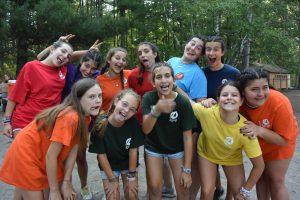 Kamaji’s campers are energetic, fun-loving, friendly and excited about new experiences. They are quiet, loud, reserved, outgoing, short, tall, athletic, artsy, theatrical, bookish, adventurous… okay, okay, truth is, we cannot define a Kamaji camper as any one “thing”.
Kamaji’s campers are energetic, fun-loving, friendly and excited about new experiences. They are quiet, loud, reserved, outgoing, short, tall, athletic, artsy, theatrical, bookish, adventurous… okay, okay, truth is, we cannot define a Kamaji camper as any one “thing”.
As a matter of fact, the only prerequisites first-time campers need to join Kamaji’s summertime family are the desire to have fun, the willingness to try new things and the wish to develop life-long friendships.
Kamaji is a community which values diversity. We work hard to ensure that Kamaji includes campers – and staff– from all over the United States (and other countries, too) and of all religious, ethnic, cultural, racial and socioeconomic backgrounds. What better place than summer camp to learn that each person should be judged by her behavior rather than by her beliefs or her appearance?
Our campers are the essence of what makes Kamaji the place that it is. Without them, Kamaji would simply be a physically beautiful place; with them, Kamaji is a magical place.
How can my daughter make friends at camp?
Friendships at camp have to potential to be some of the closest and most positively influential relationships a Kamaji camper will have. But making friendships in a new environment, with new people can be intimidating and one of the things we get asked about the most before girls attend Kamaji. Our program is set up in a way to help girls make connections with friends of all different ages and from different cabins in camp. Here are a few examples:
In the Cabin
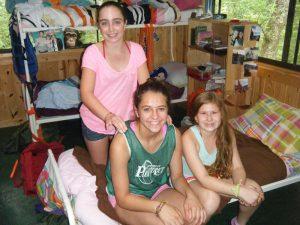 It is within the cabin group where campers are first introduced to each other and begin forming relationships. Kamaji campers live in cabin groups with other girls of their same age and in the same grade in school. Kamaji’s cabin counselors are trained to make sure that campers begin making connections as soon as they arrive — they help the campers settle into the cabin, they plan get-to-know-you games and activities and they watch out for those kids who don’t seem to be making connections quickly.
It is within the cabin group where campers are first introduced to each other and begin forming relationships. Kamaji campers live in cabin groups with other girls of their same age and in the same grade in school. Kamaji’s cabin counselors are trained to make sure that campers begin making connections as soon as they arrive — they help the campers settle into the cabin, they plan get-to-know-you games and activities and they watch out for those kids who don’t seem to be making connections quickly.
Cabinmates, like sisters, learn each other’s likes and dislikes; they play together, eat together, work together, make group decisions together, resolve conflicts together, share the same room together, sing songs together, laugh and sometimes even cry together; most importantly, they grow up together.
In the Instructional Activity Program
Kamaji campers choose the activities they, as individuals, want to take each week. With the guidance of our program staff, a camper is placed in activities of her own choosing – in a level commiserate with her level of ability rather than her age. So were your daughter to choose sailing as one of her activities, she would be in a same level sailing class with campers who cross all age groups and live in various cabins – campers who share the same interest as your daughter. We know common interests and shared experiences play key roles in camper friendships. Even a more reserved camper finds comfort and confidence in knowing that others enjoy the same things – be it waterskiing or horseback riding or drama or tennis – that she enjoys; and while learning or practicing a skill, she develops friendships, too.
All Camp Programs
Each evening Kamaji’s entire population – camper and staff alike – come together for a single all-camp program. Whether it be a rousing game of All Camp Capture the Flag, a Mud Run, a Carnival Night ,relay races up on the archery field, a Dance Off, Skit Night in the Lodge or a quiet reflective night around the Council Fire where all join in singing songs, telling stories, listening to the strain of Taps being sung from afar – there is yet another opportunity for campers to meet and interact with others they’ve not met in their cabin group or through the activity program. Not only will a camper make friends with other campers when joining in on all-camp fun, equally important are the friendships a camper develops with Kamaji’s staff.
Kamaji’s Tribes: A Truly Unique Experience
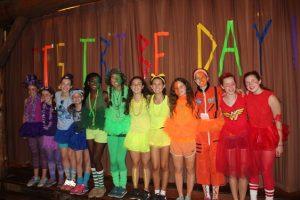 At the beginning of her first summer at Kamaji, each camper is “initiated” into one of Kamaji’s six tribes. The six – Ishkaday, Waubun, Mundahmin, Metig, Geshig and Nanahtahga – provide each camper with a sense of belonging. Each tribe consists of campers of all ages, providing older girls with leadership opportunities and younger girls with “big sister” friends.
At the beginning of her first summer at Kamaji, each camper is “initiated” into one of Kamaji’s six tribes. The six – Ishkaday, Waubun, Mundahmin, Metig, Geshig and Nanahtahga – provide each camper with a sense of belonging. Each tribe consists of campers of all ages, providing older girls with leadership opportunities and younger girls with “big sister” friends.
Tribes, too, give campers of all age groups the chance to interact with each other and “connect” with the wider camper population. It really is impossible to describe the strong bonds of friendship and loyalty that develop between tribe members. Not only are girls connected with the campers in their tribe currently, but they are connected to 100+ years of Kamaji history. Whenever meeting a Kamaji alum, campers can always ask about tribes and have an immediate bond with another person whom they’ve never met previously.
We firmly believe that this program helps campers make connections with girls from all over camp. We also believe that one of the reason that Kamaji has a reputation for being a camp for “nice girls” is because of all the opportunities for mixed-aged friendships. It is easy to be nice to someone when they are already familiar. That is not just some girl, that is the camper in your ceramics class or the new camper that joined your tribe. All of our programs help strip campers of anonymity and allow each camper to feel how much she matters as part of this community.
Where do campers live?
Groups of eight to ten campers of the same age are housed together in cabin groups. Each cabin group has three counselors. The make-up of each cabin group reflects the geographical diversity we strive to maintain at Kamaji. Therefore, it’s likely that a first-time camper will not know others in her cabin group. We believe that’s a very positive way to begin a camp experience: untethered to others from her hometown or school; open to developing new, “camp friendships” – friendships that a camper develops on her own. It’s a positive step toward developing the confidence and independence your daughter will need as an adult.
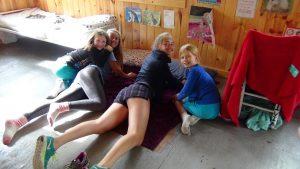 Our cabins are big, bright and airy – and all have been totally renovated and updated as of 2008. There is plenty of storage space for all our campers’ clothing and camp equipment.
Our cabins are big, bright and airy – and all have been totally renovated and updated as of 2008. There is plenty of storage space for all our campers’ clothing and camp equipment.
One thing worth noting is that there is no electricity in the cabins. This is not as big a deal as one would initially think. In fact, when the cabins were being renovated, our campers specifically requested that we not add electricity. What it means is that Kamaji’s campers are truly unplugged and disconnected yet connected to each other.
This disconnection from “stuff” allows them to connect with one another. What is “missing” at Kamaji are their phones and computers. What is present at Kamaji — wholesome, playful, connected-to-each-other, physically active, imaginative, creative campers whose cabinmates are “real” friends and whose counselors, using flashlights, read bedtime stories to them at night.
Friendship becomes tactile, instead of talking across a lighted room or holding up a yearbook, campers sit shoulder-to-shoulder and knee-to-knee to play card games around a battery-operated lantern or paging through a yearbook together.
There are no bathrooms in the cabin; instead several cabins cluster around centrally located washhouses scattered throughout camp. Our washhouses have toilets, sinks and individual showers and, like our camper cabins, have all been recently renovated and updated. Plus, with the bathrooms in separate buildings, you don’t have yucky bathroom problems in the building where you live! We are lucky to have a hardworking housekeeping staff that keep the washhouses clean twice a day.
What is Camp Kamaji’s program like?
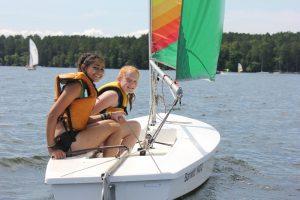 Kamaji offers an individualized, noncompetitive instructional program in over 20 activities. At our waterfront your daughter can choose swimming, sailing, canoeing, sea-kayaking, paddleboarding, water-skiing, wake-boarding, windsurfing and fishing. Or, head inland and she can take tennis, archery, horseback riding and wellness.
Kamaji offers an individualized, noncompetitive instructional program in over 20 activities. At our waterfront your daughter can choose swimming, sailing, canoeing, sea-kayaking, paddleboarding, water-skiing, wake-boarding, windsurfing and fishing. Or, head inland and she can take tennis, archery, horseback riding and wellness.
She can be creative in our theater, arts and crafts, painting and drawing, ceramics and pottery, dance, and manual photography programs. For the more adventuresome there’s a 60 foot climbing wall and a low ropes element course as well as campcraft and wilderness trip orientation.
And depending on the talents and skills of our staff, we offer weekly electives including but not limited to Mad Science, basketball, lacrosse, field hockey, KamaGlee . . .
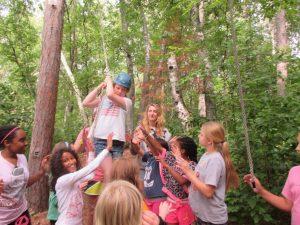 Your daughter will choose — with guidance from our staff — on a weekly basis those activities she would like to participate in. We will encourage her to participate in a well-rounded program — and allow her to progress at her own rate. We’ll make sure she is placed in a level of instruction that is appropriate to her skills, optimizing her learning opportunity. We will provide a safe environment where she can step out of her comfort zone and try things she never imagined she could do . . . where she can attempt risks, get up and try-try again, and succeed. With the support and encouragement of Kamaji’s staff, she’ll ultimately master a sense of accomplishment that is real and enduring.
Your daughter will choose — with guidance from our staff — on a weekly basis those activities she would like to participate in. We will encourage her to participate in a well-rounded program — and allow her to progress at her own rate. We’ll make sure she is placed in a level of instruction that is appropriate to her skills, optimizing her learning opportunity. We will provide a safe environment where she can step out of her comfort zone and try things she never imagined she could do . . . where she can attempt risks, get up and try-try again, and succeed. With the support and encouragement of Kamaji’s staff, she’ll ultimately master a sense of accomplishment that is real and enduring.
And while we can make no guarantee that your daughter will leave camp a Wimbledon-caliber tennis star or an America’s Cup sailor (but, then again, who knows??!!), we’ll definitely teach her concrete skills — skills she can take with her for the rest of her life — in a variety recreational activities. Our goal is that each camper knows more on day 18 than she did on day 1. We want our campers to set goals and work hard to achieve them, competitive only with herself and comparing herself to what she knew at the beginning of camp vs. the end.
Does Kamaji offer wilderness trips?
Yes! Each cabin group participates in an overnight, camping trip. They vary in length from one night for our youngest campers to a week up in Atikoken, Ontario for our oldest campers. Accompanied by specially-trained and experienced (and fun!) Trip Leaders, campers can go on overnight canoeing, kayaking, camping, hiking, rock climbing and horseback riding trips.
Trips last from two to nine days. The goal of our wilderness trip program is to give each camper a meaningful and enjoyable outdoor experience. If she returns from her trip more aware of the beauty of the natural world; if she feels an even closer kinship to those who accompanied her; if she’s proud of herself for living up to the challenge and trying something outside her “normal” routine –then our goal has been achieved.
Who works at Kamaji?
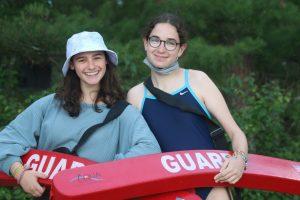 Kamaji is only as good as its staff. They are the people who are directly responsible for making a camper’s experience the best it possibly can be. They make Kamaji happen. Their impact is far reaching and can be influential far after the camping season is past.
Kamaji is only as good as its staff. They are the people who are directly responsible for making a camper’s experience the best it possibly can be. They make Kamaji happen. Their impact is far reaching and can be influential far after the camping season is past.
Kamaji’s staff, like its campers, is a diverse group. Our total staff numbers over 90. Included in that number are 58 cabin counselors and LTs (former Kamaji campers who are participating in our Leadership Training Program), an on-site licensed RN or doctor and three nursing assistants, activity program specialists including our six wilderness trip leaders. Add to that our full complement of support staff including administrative, kitchen, office and maintenance staff. Many of our staff return year after year. In fact, many are former Kamaji campers! Ninety percent are college-aged or older.
Our staff join us from cities not only from all over the United Sates but also from several other countries; countries often represented in Kamaji’s staff line-ups include England, Ireland, Mexico, Australia and New Zealand.
While nearly half of our staff members return summer after summer, we think it is important to include new staffers each summer who can bring their fresh, fun and creative ideas to camp to make our program even better!
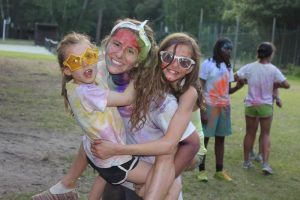 Much of the Kamaji’s “off-season” is focused on bringing together the strongest group of staff possible for each summer. We don’t choose “just anyone” to work at Kamaji. Even our former campers must complete the same rigorous interview process followed by reference checks as well as a background check. We recruit primarily from college campuses and work toward a common goal of making the summer a safe, fun and enriching experience for all of our campers.
Much of the Kamaji’s “off-season” is focused on bringing together the strongest group of staff possible for each summer. We don’t choose “just anyone” to work at Kamaji. Even our former campers must complete the same rigorous interview process followed by reference checks as well as a background check. We recruit primarily from college campuses and work toward a common goal of making the summer a safe, fun and enriching experience for all of our campers.
What do we look for in our staff? The list of qualifications, character and personality traits as well as expertise, is long. As succinctly as possible Kamaji looks for staff who are friendly and concerned, reliable and responsible, creative and patient, supportive and respectful, dedicated and committed, understanding and caring, fun and upbeat, generous and child-like. Kamaji’s staff must have initiative and enthusiasm, energy and a positive attitude, maturity and sensitivity, be excited about working with kids, and be willing to immerse themselves totally into camp life.
We don’t hire staff who tell us that they want to work at camp because it sounds like fun. Instead we hire staff who want to make a difference – a positive difference — in the life of a child.
What if my daughter gets sick at camp?
In addition to a full-time, ‘round-the-clock licensed RN or physician on site at Camp Kamaji, we also employ three full-time nursing assistants who live at Club Med (Kamaji’s health center) — all of whom tend to the physical and emotional well-being of Kamaji’s campers and staff. We also contract with Sanford Health Center in Bemidji to assist in any pediatric urgent care needs; whether through telehealth or in person.
In addition to the care provided at Camp Kamaji, we enjoy a positive professional working relationship with medical providers and services in the nearby town of Bemidji. If in need of additional medical care, we are just 15 minutes from an orthodontist or dentist.
With so many great camps to choose from, how does a parent and future camper pick one?
Choosing a camp can be overwhelming, especially since so many can look similar “on paper”. Still, each and every camp is unique in its own right — as is your daughter. There is something that sets each camp apart from the next — that makes it different, special, one-of-a-kind — just as your daughter is. We don’t subscribe to the theory that “one-size-fits-all.” That is why careful consideration is key when making a decision concerning what may be one of your daughter’s most memorable childhood experiences.
Sorting through websites, camp brochures, promotional videos, talking with families who send their daughters to camp, and meeting one-on-one with the different camp directors will provide a worthwhile investment of time and energy. You want to learn about the “personality” of camp, to find the one that is the best “fit” for your daughter.
We believe that getting together in person (or over Zoom if an in-person visit is not feasible), is the best way to learn more about camp and to help you decide if Kamaji is the best match for your daughter. Please contact Kat or Jason to set up a time to talk about Kamaji and to meet your future-camper!
